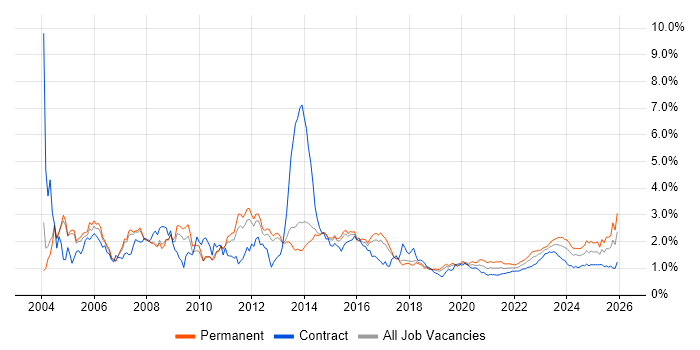Support Engineer
UK > Work from Home
The median Support Engineer salary for remote/hybrid work is £37,500 per year, according to job vacancies posted during the 6 months leading to 5 March 2026.
The table below compares current salary benchmarking and summary statistics with the previous two years.
| 6 months to 5 Mar 2026 |
Same period 2025 | Same period 2024 | |
|---|---|---|---|
| Rank | 90 | 163 | 150 |
| Rank change year-on-year | +73 | -13 | +50 |
| Permanent jobs requiring a Support Engineer | 486 | 301 | 631 |
| As % of all permanent jobs with remote/hybrid work options | 2.91% | 2.07% | 2.22% |
| As % of the Job Titles category | 3.10% | 2.18% | 2.32% |
| Number of salaries quoted | 364 | 244 | 574 |
| 10th Percentile | £26,875 | £27,575 | £25,250 |
| 25th Percentile | £30,500 | £30,750 | £29,313 |
| Median annual salary (50th Percentile) | £37,500 | £35,000 | £35,000 |
| Median % change year-on-year | +7.14% | - | - |
| 75th Percentile | £45,000 | £50,291 | £48,688 |
| 90th Percentile | £58,750 | £59,250 | £67,500 |
| UK median annual salary | £35,000 | £35,000 | £33,000 |
| % change year-on-year | - | +6.06% | -1.49% |
All Permanent IT Job Roles
Work from Home
For comparison with the information above, the following table provides summary statistics for all permanent IT job vacancies with remote/hybrid work options. Most job vacancies include a discernible job title that can be normalized. As such, the figures in the second row provide an indication of the number of permanent jobs in our overall sample.
| Permanent vacancies in Work from Home with a recognized job title | 15,656 | 13,796 | 27,224 |
| % of permanent jobs with a recognized job title | 93.77% | 95.05% | 95.85% |
| Number of salaries quoted | 10,518 | 8,796 | 22,743 |
| 10th Percentile | £31,250 | £35,000 | £33,250 |
| 25th Percentile | £42,500 | £47,000 | £42,500 |
| Median annual salary (50th Percentile) | £60,000 | £62,500 | £57,500 |
| Median % change year-on-year | -4.00% | +8.70% | -8.00% |
| 75th Percentile | £80,000 | £81,250 | £75,643 |
| 90th Percentile | £97,500 | £102,500 | £95,000 |
| UK median annual salary | £55,000 | £60,000 | £55,000 |
| % change year-on-year | -8.33% | +9.09% | -8.33% |
Support Engineer
Job Vacancy Trend for Remote/Hybrid Roles
Historical trend showing the proportion of permanent IT job postings featuring 'Support Engineer' in the job title and offering remote or hybrid work options relative to all permanent IT jobs advertised.

Support Engineer
Salary Trend for Remote/Hybrid Jobs
Salary distribution trend for remote Support Engineer job vacancies.

Support Engineer
Salary Histogram for Remote/Hybrid Jobs
Salary distribution for jobs with remote/hybrid work options citing Support Engineer over the 6 months to 5 March 2026.
Support Engineer Skill Set
Top 30 Co-Occurring Skills & Capabilities in Remote/Hybrid Jobs
For the 6 months to 5 March 2026, Support Engineer job roles required the following skills and capabilities in order of popularity. The figures indicate the absolute number of co-occurrences and as a proportion of all permanent jobs with hybrid/remote work options featuring Support Engineer in the job title.
|
|
Support Engineer Skill Set
Co-Occurring Skills & Capabilities in Remote/Hybrid Jobs by Category
The following tables expand on the one above by listing co-occurrences grouped by category. They cover the same employment type, locality and period, with up to 20 co-occurrences shown in each category:
|
|
||||||||||||||||||||||||||||||||||||||||||||||||||||||||||||||||||||||||||||||||||||||||||||||||||||||||||||||||||||||||||||||
|
|
||||||||||||||||||||||||||||||||||||||||||||||||||||||||||||||||||||||||||||||||||||||||||||||||||||||||||||||||||||||||||||||
|
|
||||||||||||||||||||||||||||||||||||||||||||||||||||||||||||||||||||||||||||||||||||||||||||||||||||||||||||||||||||||||||||||
|
|
||||||||||||||||||||||||||||||||||||||||||||||||||||||||||||||||||||||||||||||||||||||||||||||||||||||||||||||||||||||||||||||
|
|
||||||||||||||||||||||||||||||||||||||||||||||||||||||||||||||||||||||||||||||||||||||||||||||||||||||||||||||||||||||||||||||
|
|
||||||||||||||||||||||||||||||||||||||||||||||||||||||||||||||||||||||||||||||||||||||||||||||||||||||||||||||||||||||||||||||
|
|
||||||||||||||||||||||||||||||||||||||||||||||||||||||||||||||||||||||||||||||||||||||||||||||||||||||||||||||||||||||||||||||
|
|
||||||||||||||||||||||||||||||||||||||||||||||||||||||||||||||||||||||||||||||||||||||||||||||||||||||||||||||||||||||||||||||
|
|
||||||||||||||||||||||||||||||||||||||||||||||||||||||||||||||||||||||||||||||||||||||||||||||||||||||||||||||||||||||||||||||
